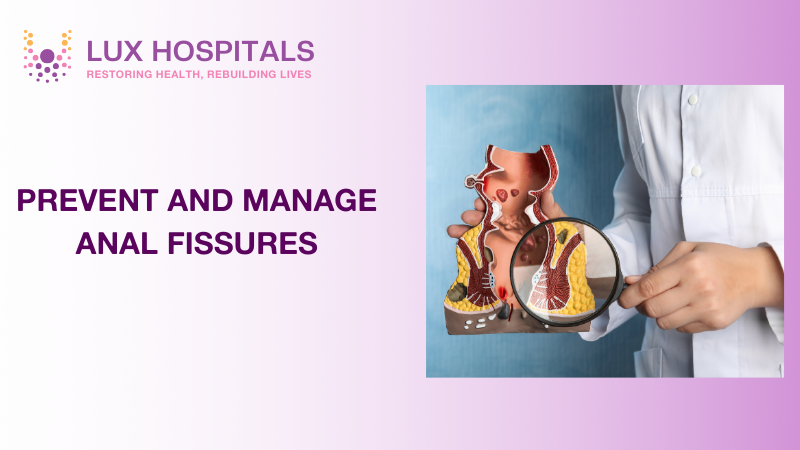How to Prevent and Manage Anal Fissures?

Anal fissures are small tears in the lining of the anus, which may be painful during bowel movements. While common, most can be effectively treated with lifestyle modifications, medical treatments, and preventive care.
This article examines ways to prevent and manage anal fissures, including information on their treatment, associated risks, and specialist care.
Understanding Anal Fissures
Anal fissures occur when the thin tissue that lines the inside of the anal canal gets damaged, usually through trauma or strain. Hard stools, excessive wiping, and lengthy diarrhea are common causes.
Chronic anal fissures are probably caused by underlying health conditions such as inflammatory bowel diseases, bad blood supply to the affected area, or excessive tension in the anal sphincter. Though painful, proper care can promote healing and prevent recurrence.
Types of Anal Fissures
There are basically two types of anal fissures:
- Acute Anal Fissures: These are short-lived and mostly heal in a couple of weeks with good care.
- Chronic Anal Fissures: These may necessitate medical intervention, such as anal fissure surgery if they continue for longer than six weeks.
Prevention of Anal Fissures
Stay Hydrated
One should drink enough water to make the bowel movements smooth and the stool soft. To help digestion and reduce the pressure on the anal region, it is recommended to drink 8–10 glasses of water a day.
Eat a High-Fiber Diet
Fiber is also quite important in preventing constipation, which is one of the major causes of anal fissures. Take fiber-rich foods like fruits, vegetables, whole grains, and legumes that help maintain good bowel movements. The foods make stools soft. Fiber supplements may be useful for people who may have specific difficulties in their diets.
Good Toilet Habits
- Never postpone bowel movements. A stool that stays in the canal longer becomes dry, hard, and difficult to pass.
- Refrain from straining during defecation, as this can put undue pressure on the anal lining.
- Avoid sitting on the toilet for long periods to minimize strain on the anal region.
Practice Good Hygiene
Clean the anal region with neutral wipes or warm water. Harsh soaps and much scrubbing should be avoided, for these can further irritate sensitive skin.
Regular Exercise
Regular moderate-intensity exercise keeps the digestive system in good tone and reduces the likelihood of constipation. Activities like yoga, swimming, and walking improve bowel health and overall well-being.
Anal Fissures Management
Home Remedies
- Sitz Baths: Soaking in warm water for 10 to 15 minutes several times a day will help relax anal muscles, relieve inflammation, and promote healing.
- Topical Treatments: Over-the-counter creams or ointments containing lidocaine or hydrocortisone provide relief from pain and inflammation.
- Dietary Adjustments: Increasing fiber and fluid intake can make stools easier to pass, reducing strain on the anal region.
- Pain Relievers: Acetaminophen or ibuprofen are two examples of medications that can assist in reducing bowel movement pain.
Medical Treatment for Anal Fissures
- Topical Drugs
Nitroglycerin or calcium channel blocking ointments prescribed to relax the anal sphincter and increase blood flow to the region help in the chronic fissure case.
- Botox injections
When medical treatment is inadequate, the use of Botox can paralyze the anal sphincter partially, which stops spasms and allows the fissure to heal.
- Anal Fissure Surgery
A surgical treatment for severe or chronic cases is lateral internal sphincterotomy, which reduces sphincter muscle tension and improves recovery. For guidance on the best course of action, speaking with an anal fissure specialist is essential.
- Professional Guidance
If symptoms persist despite home care, seek advice from a healthcare provider. Specialists can offer advanced treatments and identify any underlying conditions contributing to the issue. Signs warranting professional evaluation include severe pain, recurrent bleeding and signs of infection such as swelling or fever.
Long-Term Strategies for Prevention
- Regular Check-Ups
Regularly speaking with a healthcare provider might help to detect and address issues before they get worse. For those who are prone to intestinal problems, this is especially important.
- Stress Management
Excessive stress can lead to digestive problems and indirectly affect bowel habits. Exercises like yoga, meditation, and mindfulness can improve general health and reduce stress.
- Educate Yourself
Being aware of the many kinds of anal fissures and what causes them enables people to take preventative action. Acute fissures typically heal within weeks, while chronic fissures may require more comprehensive care.
Conclusion
Anal fissures can be prevented and treated with a combination of healthy lifestyle choices, dietary modifications, and early medical intervention. Maintaining anal health requires proactive care, whether it takes the form of basic practices like drinking plenty of water or seeking the advice of an anal fissure specialist for more sophisticated procedures like anal fissure surgery.
Frequently Asked Questions
The best treatment for fissures includes stool softeners, dietary fiber, warm sitz baths, and topical ointments. Severe cases may require surgical procedures like lateral internal sphincterotomy.
The main cause of fissures is constipation, which leads to hard, dry stools that strain and tear the anal lining during bowel movements.
You should see a doctor for an anal fissure if it doesn’t heal within a few weeks, causes severe pain or bleeding. Lux Hospitals, with its leading proctologists and best industry experience, offers expert care for effective diagnosis and treatment of anal fissures. Seek medical advice if you experience signs of infection, such as swelling or discharge.
Complications of anal fissures include chronic pain, bleeding, infection, formation of a sentinel pile (skin tag), and the development of a non-healing fissure or anal fistula.
Yes, anal fissures can be prevented by maintaining soft stools through a high-fibre diet, staying hydrated, avoiding straining during bowel movements, and practicing good anal hygiene.





















